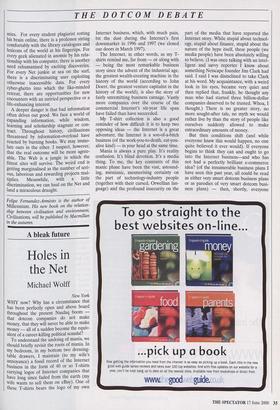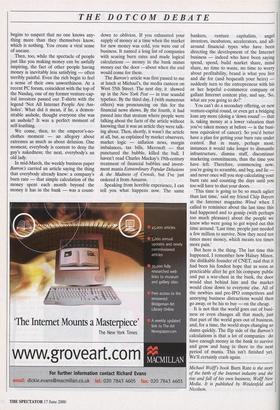A bleak future
Holes in the Net
Michael Wolff
New York WHY now? Why has a circumstance that has been perfectly open and above board throughout the present Nasdaq boom — that dotcom companies do not make money, that they will never be able to make money — all of a sudden become the equiv- alent of a career-killing political scandal? To understand the undoing of mania, we should briefly revisit the roots of mania. In my bedroom, in my bottom two dressing- table drawers, I maintain (to my wife's annoyance) a fossil record of the Internet business in the form of 40 or so T-shirts carrying logos of Internet companies that have long since faded from the earth (my Wife wants to sell them on eBay). One of these T-shirts bears the logo of my own Internet business, which, with much pain, bit the dust during the Internet's first downmarket in 1996 and 1997 (we closed our doors in March 1997).
The Internet, in other words, as my T- shirts remind me, far from — or along with — being the most remarkable business story since the advent of the industrial age, the greatest wealth-creating machine in the history of the world (according to John Doerr, the greatest venture capitalist in the history of the world), is also the story of fairly unremitting business carnage. Vastly more companies over the course of the commercial Internet's six-year life span have failed than have succeeded.
My T-shirt collection is also a good reminder of how difficult it is to keep two opposing ideas — the Internet is a great adventure; the Internet is a son-of-a-bitch business (of the work-you-to-death, eat-you- alive kind) — in your head at the same time.
Mania is always a pure play. It's reality confusion. It's blind devotion. It's a media thing. To me, the key constants of this manic phase have been the vast, astound- ing, messianic, mesmerising certainty on the part of technology-industry people (together with their cursed, Orwellian lan- guage) and the profound insecurity on the part of the media that have reported the Internet story. While stupid about technol- ogy, stupid about finance, stupid about the nature of the hype itself, these people (we media people) have been absolutely willing to believe. (I was once talking with an intel- ligent and savvy reporter I know about something Netscape founder Jim Clark had said. I said I was disinclined to take Clark at his word. My acquaintance, with a weird look in his eyes, became very quiet and then replied that, franldy, he thought any man who had started three billion-dollar companies deserved to be trusted. Whoa, I thought.) There is no greater story, no more sought-after tale, no myth we would rather live by than the story of people like ourselves suddenly allowed to make extraordinary amounts of money.
But then conditions shift (and while everyone knew this would happen, no one quite believed it ever would). If everyone begins to think they can and ought to go into the Internet business—and who has not had a perfectly brilliant e-commerce idea? (of the innumerable business plans I have seen this past year, all could be read as either very smart dotcom business plans or as parodies of very smart dotcom busi- ness plans) — then, shortly, everyone
THE DOTCOM DEBATE
begins to suspect that no one knows any- thing more than they themselves know, which is nothing. You create a viral sense of unease.
Then, too, while the spectacle of people just like you making money can be awfully inspiring, the fact of other people having money is inevitably less satisfying — often terribly painful. Even the rich begin to feel a sense of their own unworthiness. At a recent PC forum, coincident with the top of the Nasdaq, one of my former venture-cap- ital investors passed out T-shirts with the legend 'Not All Internet People Are Ass- holes'. What did it mean, if he, a demon- strable asshole, thought everyone else was an asshole? It was a perfect moment of self-loathing.
We come, then, to the emperor's-no- clothes moment — an allegory about extremes as much as about delusion. One moment, everybody is content to deny the guy's nakedness; the next, everybody's an old lady.
In mid-March, the weekly business paper Barron's carried an article saying the thing that everybody already knew: a company's burn rate — that simple calculation of the money spent each month beyond the money it has in the bank — was a count- down to oblivion. If you exhausted your supply of money at a time when the market for new money was cold, you were out of business. It named a long list of companies with searing burn rates and made logical calculations — money in the bank minus money out the door —about when the end would come for them.
The Barron's article was first passed to me at lunch at Michael's, the media canteen on West 55th Street. The next day, it showed up in the New York Post — in true scandal typeface. By the third day, I (with numerous others) was pronouncing on this for the financial news shows. By the fourth, it had passed into that stratum where people were talking about the facts of the article without knowing that it was an article they were talk- ing about. Then, shortly, it wasn't the article at all, but, as explained by market observers, market logic — inflation news, margin imbalances, tax bills, Microsoft — that punctured the bubble, killed the bull. I haven't read Charles Mackay's 19th-century treatment of financial bubbles and invest- ment mania Extraordinary Popular Delusions & the Madness of Crowds, but I've just ordered it from Amazon.
Speaking from horrible experience, I can tell you what happens now. The same bankers, venture capitalists, angel investors, incubators, accelerators, and all- around financial types who have been directing the development of the Internet business — indeed who have been saying spend, spend, build market share, mind share, no time to waste, no time to worry about profitability, brand is what you live and die for (and bequeath your heirs) — suddenly turn to the entrepreneur with his or her hopeful e-commerce company or gallant Internet content play, and say, 'So, what are you going to do?'
You can't do a secondary offering, or new venture-capital round, or even get a bridging loan any more (doing a 'down round' — that is, taking money at a lower valuation than you've taken money at before — is the busi- ness equivalent of cancer). So you'd better have a plan for getting your burn rate under control. But in many, perhaps most, instances it would take longer to dismantle infrastructure, dismiss staff, discontinue marketing commitments, than the time you have left. Therefore, commencing now. you're going to scramble, and beg, and lie — and never once will you stop calculating your burn rate and counting the days until you too will have to shut your doors.
'This time is going to be so much uglier than last time,' said my friend Chip Bayers at the Internet magazine Wired when I called to reminisce about the last time this had happened and to gossip (with perhaps too much pleasure) about the people we knew who were going to get wiped out this time around. 'Last time, people just needed a few million to survive. Now they need ten times more money, which means ten times more pain.'
But here is the thing. The last time this happened, I remember how Halsey Minor, the dislikable founder of CNET, said that it had been his fondest hope that as soon as practicable after he got his company public and put a war-chest in the bank, the door would shut behind him and the market would close down to everyone else. All of the newbies and pre-IPO competitors and annoying business distractions would then go away, or be his to buy — on the cheap.
It is not that the world goes out of busi- ness or even changes all that much, just that part of the world goes out of business, and, for a time, the world stops changing so damn quickly. The flip side of the Barron's calculations is that a lot of companies do have enough .money in the bank to survive and grow and hang in there to the next period of mania. This isn't finished yet. We'll certainly crash again.
Michael Wolff's book Burn Rate is the story of the birth of the Internet indusny and the rise and fall of his own business, Wolff New Media. It is published by Weidenfeld and Nicolson.











































































 Previous page
Previous page